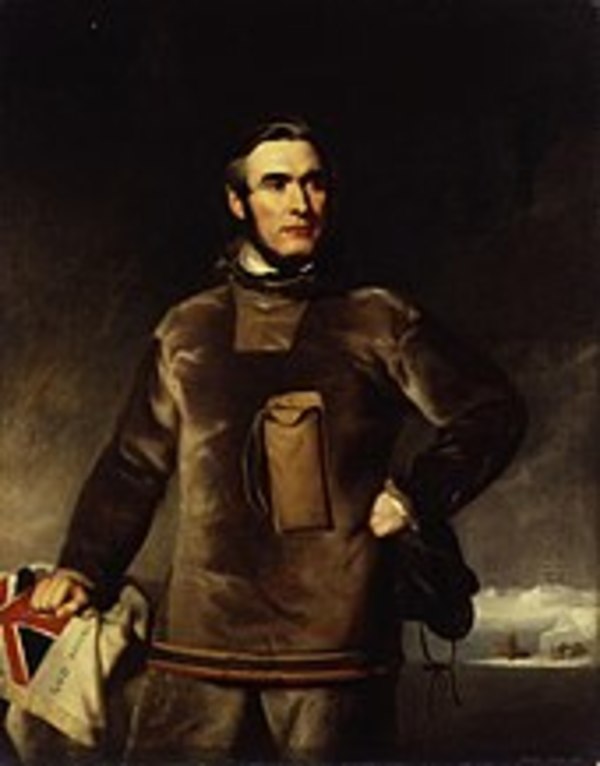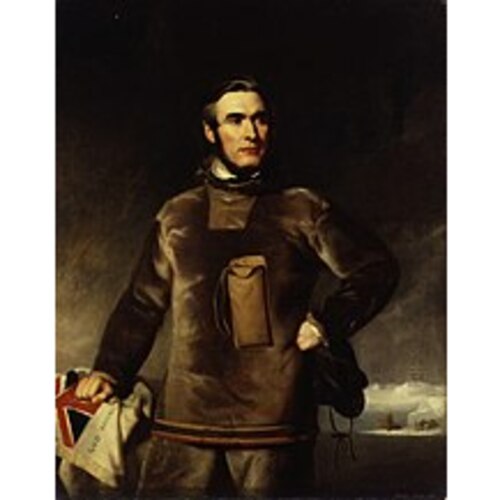
Source: Courtesy of Wikimedia Commons
PENNY, WILLIAM, whaling master and explorer; b. 12 July 1809 in Peterhead, Scotland, son of William Penny and Helen Robertson; m. Margaret Irvine, and they had two sons and three daughters; d. 1 Feb. 1892 in Aberdeen, Scotland.
William Penny made his first whaling voyage at the age of 12 on his father’s ship Alert. By 1829 he had attained the rank of mate, and was making annual trips to Davis Strait. He obtained his first command, Neptune, in 1835, a year in which the whalers met some of the worst ice conditions in history. After similar experiences the next two years, Penny became a leading supporter, with Captain James Clark Ross*, of the abandonment by whalers of their dangerous routine of summer voyages from Britain in favour of whaling from the safety of shore stations on Baffin Island (N.W.T.). Penny favoured a site on one of the large sounds at the southeast of the island, but his plan demanded some preliminary exploration because the area had been largely unknown and unvisited since the 16th-century voyages of Sir Martin Frobisher* and John Davis*. Penny’s first attempt at exploration in 1839 with Neptune was unsuccessful, but he did meet an Inuk, Eenoolooapik*, who knew of a large inlet in that region, called Tenudiakbeek by the Inuit, and who drew a map of it. Penny took him back to Scotland, hoping his testimony would help to gain support for an exploring expedition. That plan failed, but Penny did persuade the owner of his new ship, Bon Accord, to allow him time for exploration as well as whaling in 1840. At the end of July, with Eenoolooapik on board, Penny located the sound running into Baffin Island off Davis Strait. He explored it carefully and, believing it to be a new discovery, named it Hogarth’s Sound. He had, in fact, entered Cumberland Sound, first discovered by Davis.
For the next three years Penny was without a ship because of the decline of Arctic whaling, but in 1844 he returned to Cumberland Sound on St. Andrew. For the rest of the decade he had the satisfaction of seeing the sound steadily grow in importance for the whalers, as they realized that it remained free from ice until very late in the year. During the same period, however, Penny’s interest was captured by the search for Sir John Franklin*’s expedition, missing since 1845. During the whaling seasons of 1847 and 1849 Penny tried, unsuccessfully, to sail through Lancaster Sound, hoping to make contact with Franklin. He then wrote to the influential Lady Franklin [Griffin*] and, with her support, won command of an Admiralty-backed search expedition with the ships Lady Franklin and Sophia. He sailed in April 1850 and, after helping to locate and search the site of Franklin’s first winter quarters, on Beechey Island, he wintered in Assistance Harbour (Assistance Bay), Cornwallis Island, in close proximity to both the large naval expedition led by Captain Horatio Thomas Austin* and Sir John Ross*’s small private outfit. The three men agreed to search separate areas in the spring, and Penny chose Wellington Channel. Travelling by sledge and boat from May to July, he discovered and explored Queens Channel and sighted the strait to the north which now bears his name. He found no traces of Franklin, but returned to his ships convinced that Sir John had gone by way of Wellington Channel (which he had, but only briefly) and that the area needed to be examined further. He reported this opinion to Austin on 11 August, but the interview ended in an unseemly quarrel. The curious outcome was that both expeditions promptly abandoned the search and returned home, Penny arriving on 21 Sept. 1851. The following month a special Arctic Committee was convened by the Admiralty to examine the conduct of both men, especially their unexpected return. Although its report commended their actions, and although Lady Franklin stood firmly by her friend Penny throughout, his reputation at the Admiralty was damaged by his apparently petulant treatment of Austin, and he was denied any further participation in the search.
Frustrated and annoyed, Penny renewed his interest in whaling in Cumberland Sound. He was disturbed, however, that an American ship had left a party of whalers to spend the winter of 1851–52 in the sound. Worried by this foreign encroachment on British territory, Penny in 1852 headed the formation of the Aberdeen Arctic Company, whose objects were to advance British activities in the area and to pressure the government to offer the company an exclusive grant of land in the sound in order to keep the Americans out. The scheme was rejected, but the British ambassador in Washington was instructed to inform the United States government of Britain’s concern.
In 1853–54 Penny took a further step towards realizing his plans of the 1830s, leading the first whaling expedition deliberately to winter with ships in the Baffin Bay and Davis Strait region. In the spring of 1854, from his base on Lady Franklin and Sophia in Cumberland Sound, he introduced the practice of floe whaling, done from the edge of landfast ice while wintering ships were still frozen into harbour. The routine allowed whalers to commence work earlier in the season than was possible using the traditional shipborne methods. These innovations were important steps towards prolonging the life of a failing Davis Strait whaling industry; many others were to follow his wintering practice in the half-century before whaling ceased altogether. Penny himself was to winter on three more occasions. At the same time he was alert to the disturbance that the whalers were causing to the Inuit of Baffin Island, and in order to minimize any corrupting effect he sought for some years to introduce a missionary to Cumberland Sound. On his voyage of 1857–58 he was accompanied not only by his wife and son but also by the Moravian missionary Mathias Warmow, who preached and observed native conditions throughout the winter. Warmow and Penny thought the experiment successful, but the Moravian Church later declined to establish a permanent mission.
Penny’s last contribution to the whaling industry was to be, from 1859, among the early promoters of the construction of steam whalers. In 1861 he commanded one such vessel, Polynia of Dundee. He returned to his native Peterhead to make his final whaling voyage on Queen in 1863–64. The last 25 years of his life were spent in retirement in Aberdeen, where he died in 1892.
Penny is usually best remembered for his brief and unhappy role in the Franklin search, but he should perhaps be better known as one of the most influential and innovative figures in British Arctic whaling history. He was a temperamental and highly emotional character, passionately dedicated to any cause he adopted, but he sometimes made that cause more difficult to advance because of his impetuous and occasionally ill-tempered approach. He was respected, but not universally liked by his whaling colleagues; yet Lady Franklin, who inspired in him deep loyalty, had a genuine and lasting affection for him: “Whatever his faults & failings – & I had some reason to blame him – I could never abandon him.”
Scott Polar Research Institute (Cambridge, Eng.), ms 116 (William Penny, personal arch.); ms 248, Jane Franklin and Sophia Cracroft, journals, letter-books, and corr. relating to the Franklin search, c. 1847–59; ms 1424 (William and Margaret Penny, journal, 1857–58). Arctic whalers, icy seas: narratives of the Davis Strait whale fishery, ed. W. G. Ross (Toronto, 1985). R. A. Goodsir, An Arctic voyage to Baffin’s Bay and Lancaster Sound in search of friends with Sir John Franklin (London, 1850). G.B., Parl., Command paper, 1852, 50, no.1435: 1–261, Arctic expeditions: report of the committee appointed by the lords commissioners of the Admiralty to inquire into and report on the recent Arctic expeditions in search of Sir John Franklin . . . ; no.1436: 269–670, Additional papers relative to the Arctic expedition under the orders of Captain Austin and Mr. William Penny. Sherard Osborn Stray leaves from an Arctic journal; or, eighteen months in the polar regions, in search of Sir John Franklin’s expedition, in the years 1850–51 (London, 1852). P. C. Sutherland, Journal of a voyage in Baffin’s Bay and Barrow Straits, in the years 1850–1851, performed by H.M. ships “Lady Franklin” and “Sophia,” under the command of Mr. William Penny, in search of the missing crews of H.M. ships “Erebus” and “Terror” . . . (2v., London, 1852). Philip Goldring, “Inuit economic responses to Euro-American contacts: southeast Baffin Island, 1824–1940,” CHA Hist. papers, 1986: 146–72. Clive Holland, “William Penny, 1809–92: Arctic whaling master” and “The Arctic Committee of 1851: a background study,” Polar Record (Cambridge), 15 (1970) :25–43; 20 (1980): 3–17, 105–18. W. G. Ross, “William Penny (1809–1892),” Arctic (Calgary), 36 (1983): 380–81. F. J. Woodward, “William Penny, 1809–92,” Polar Record, 6 (1953): 809–11.
Cite This Article
Clive Holland, “PENNY, WILLIAM,” in Dictionary of Canadian Biography, vol. 12, University of Toronto/Université Laval, 2003–, accessed December 31, 2025, https://www.biographi.ca/en/bio/penny_william_12E.html.
The citation above shows the format for footnotes and endnotes according to the Chicago manual of style (16th edition). Information to be used in other citation formats:
| Permalink: | https://www.biographi.ca/en/bio/penny_william_12E.html |
| Author of Article: | Clive Holland |
| Title of Article: | PENNY, WILLIAM |
| Publication Name: | Dictionary of Canadian Biography, vol. 12 |
| Publisher: | University of Toronto/Université Laval |
| Year of publication: | 1990 |
| Year of revision: | 1990 |
| Access Date: | December 31, 2025 |



